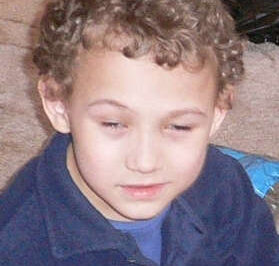
The walls of the small Russian apartment were thin, and the noise was constant. The barking continued unabated for days on end, yet the neighbors ignored it.
Terrible enough to leave dogs alone and pinned up with no food and water, but this was far worse. Living with these two dogs was a toddler.
But Vita, a sweet-faced blond boy, didn’t know he wasn’t a dog. How he was found and rescued is nothing short of a miracle.
“When Vita was born, his mother had taken him to the hospital for his initial vaccinations but never brought him back to finish his shots,” says Lilit Gorelovi, the woman who today is his foster mother. “One of the hospital doctors happened to be looking back through the records and noticed that Vita had never received all his immunizations. This compassionate doctor visited the apartment, which he found locked.
“He called the local police, who sent some officers to the apartment. They heard the barking and broke the door down.”
What the uniformed men saw on that November day in 2005 astonished them. This little boy thought he was a dog. He had lived like a dog, locked away from any human contact. He ate like a dog and slept like a dog, curled up against his furry friends at night.
For four years—from the time Vita was 18 months old—he was raised by these loving dogs. After his parents divorced, his mom had deserted him in the apartment, leaving him in the “care” of these animals. She would return every week or two to leave food in a dish on the floor, then promptly leave.
His own grandmother also knew he was there, but she did nothing to help him. Vita had lived and survived like an animal, with dogs as his only company.
Stunned, the police officers rushed the confused child to the hospital, where he wept and fought against those who tried to help him.
“He was naked, covered in feces. His hair was long and matted, cleaned only by the tongues of his dog companions. He didn’t know how to speak even a few words,” explains Jon Blume, a Moscow-based missionary.
“He had never slept alone, much less in a bed. He didn’t know how to eat, and the food they brought him looked and tasted nothing like what he was used to.”
And so Vita fought. He barked. He caused as much commotion as a 5-year-old can cause—leaving doctors and nurses wondering what to do with this troubled child: Who would take in a child that was so scarred by his past? How could he ever be normal?
Finally someone had an idea: “Remember Lilit and Sasha Gorelovi? The Christian couple who take in troubled children? That place called the House of Mercy?”
The Gorelovis had a reputation for taking the “hard cases,” and Vita’s certainly met that description. A staff member made a call. That decision changed Vita forever.
Lilit Gorelovi considered it both her passion and her calling to take care of children who had been abandoned. She had been doing it since 2002.
“She started out as a Christian mom with a heart to help street kids. She’d do anything to reach them, often crawling under train tracks, down sewer pipes and over heaps of garbage in search of them,” says Jane Blume, administrator at House of Mercy. “Once she found them, she’d round up as many as possible and invite them to sleep on the floor of her tiny, one-bedroom apartment.”
Over time, Lilit married Sasha, a Christian. The House of Mercy grew to a new level of outreach, establishing a food program for street kids that feeds 140 kids per week.
Their family of eight still live in that one-bedroom apartment, and they rent a second apartment that serves as a rehabilitation center and home for the abandoned kids they have taken in.
These kids include Diliah, 12, and Sasha, 10—two girls who witnessed their father being murdered by their mother. She stabbed him 24 times in self-defense after years of abuse and is now in a drug-rehab program. Diliah had also been abused and raped by a neighbor, and her body bears the scars of cigarette burns.
Then there is Lesha, a young boy who was the child of a prostitute. His mother used him as a drug runner to make money. Another young boy, Griesha, was raised by his 6-year-old sister for the first few years of his life.
Other youths have lived at House of Mercy, then “graduated” out on their own. Katya was raised in orphanages and on the streets and was so tough that even the boys on the street feared her. She recently graduated from the Moscow Good News Seminary and now lives independently.
Alecia—Griesha’s older sister who once cared for him—had planned to be a prostitute but another street kid brought her to House of Mercy in time. She is now in a university studying accounting.
The House of Mercy team includes Lilit and Sasha, Jane and Jon Blume, and Svetlana Yukenkova and Irieda Klotchkova, who are house caregivers and provide feeding and transportation for the children.
Well-experienced at helping kids caught up in desperate situations, Lilit was uniquely suited to accept the incredible challenge that Vita presented. Still, she’d never seen a case like his before.
The first time Lilit saw Vita she was grieved beyond words. “When we got there, I had no idea what to expect,” she says. “What would a boy be like that was raised by dogs? But God spoke to my heart, ‘Nothing is impossible with God.’
“No matter how I tried to prepare myself, I was still shocked; grieved beyond words. This darling blue-eyed boy didn’t know how to walk on two feet. If he needed to move, he would get on all fours just like the dogs.
“I could not help but notice that his hands were bigger than any other little boy’s hands his age. Even the doctors were amazed that he could have such big hands, and they concluded it was because he used them as paws and nature was trying to adjust.
“In times like this, prayer is the only thing you can do until you get your mind to comprehend the situation. It was so big, so awful, and yet so exciting because I knew my God could heal him.”
In December 2005 Vita was taken to the first real home he had ever known. The next few weeks saw little progress as he fought against those who were trying so hard to help him.
Unable to sit up for more than five minutes, Vita would just lay down in the middle of the floor and mumble to himself. Instead of walking, he would crawl around on all fours.
One of the scariest things to him was the toilet. If someone tried to help him use it, he’d make a high-pitched screech, flailing and trying to bite or kick his helper. All day he would lay on the couch and mumble to himself about running away to the forest or about eating spiders and feces.
“I wish I could say that those long months were a time of peace,” Lilit says. “But I cried in my bed many nights. I pleaded with God for a miracle that was bigger than any I had ever seen.”
Though Vita fought against so much, he also found small things that held his interest. He would always comment about the light being on. It fascinated him to no end. He still talks about lights being on or off more than anything else.
“He said that the light in his house never lit up. It made me understand more what it must have been like for this child, this toddler, alone in the dark,” Lilit recalls. “He asked where the spiders were and said we should decorate the apartment with them.”
All he remembered was his squalid home. Everything else was new and strange for him.
“When Vita ate, he quickly learned to use a giant spoon,” Lilit says. “But he wouldn’t take bites, he just shoved the food in his mouth and without chewing, he would swallow it all. If you made Vita do anything he didn’t want to, was afraid of, etcetera, he would begin making a high-pitched noise like dogs do.”
After months of struggling, Lilit and Sasha made a painful decision—but one that was right for Vita. They decided that the way to help the youngster more effectively was to get some professional help.
Lilit had once been a professional social worker, so she knew about the most famous psychiatric children’s hospital in Russia. She called and was promised that if Vita were there for a little while, psychologists and psychiatrists would work with him. They said they’d make a detailed analysis of him and show Lilit and Sasha how to help Vita become like boys his own age.
Vita was placed in the psychiatric hospital for three months. “We called often, but never found out much information. For months we feared that they would not allow him to come home with us ever again. All I could do was leave him in God’s hands there,” Lilit says.
Finally, it was time for a family visitation day. The couple joined all the parents waiting in the general room while they brought out kids one by one.
“My heart leapt in my throat as soon as I saw him,” Lilit says. “I walked over to him and smiled, hoping for any sign from him. But Vita just laid down and said he wanted to eat poop.”
Sasha recalls: “I am always amazed by the way Lilit handles herself. Although every parent had heard the exchange and was standing there staring at her, she just picked up Vita and told him we had brought some tasty treats for him.
“While visiting, we noticed that Vita had learned a joke,” Sasha continues. “After someone in the room was done laughing, he would begin laughing to show how they laughed. It was hilarious, and he quickly learned that everyone enjoys it when he tells a joke. He was speaking a little better by now.”
The couple says it was a “breakthrough moment.” They were thrilled to learn that Vita remembered the names of the other kids from their center. He had also gained weight and even looked a little pudgy. For the first time, when he drank and was asked if he wanted more, he answered no and said that he’d had enough.
Soon after, the hospital began to give Lilit and Sasha more doubts that they would ever get Vita back. They reported him to be autistic, with such deep psychiatric issues that they could not imagine why the family even wanted him back.
“But we were not giving up on Vita,” Lilit recalls. “We continued calling and began to realize that he was not there half the time. The nurses told us that he was sick all the time and kept being put in a regular medical hospital. Finally after countless calls and hundreds of hours of prayer, in March of 2006 we were allowed to take him back home.”
In little more than two years, Vita has made amazing progress. School reports tell of a child that is “peaceful, good-natured and is not aggressive with other kids.” Still, he struggles with being tired easily and speaks of himself in the third person.
But he is growing, at school and in a walk with Jesus, the couple say.
“Vita loves spending time in prayer,” they say. “Each morning and evening when we all join together in prayer, Vita prays for a long time—calling on God to bless everyone he can think of!
“He prays: ‘God bless Griesha. Hallelujah. God bless Irina. Hallelujah. God bless Diliah. Hallelujah.” And his prayer goes on and on. What a powerful little prayer warrior!”
Vita, like the other orphans in their care, is active in ministry to other orphans. He was part of both the Easter and Christmas dramas, and the other youth ministered the love of Jesus 17 times in orphanages and juvenile detention centers while sharing their life-changing testimonies.
“Each child that comes to the House of Mercy has a story that reaches a unique group of other kids, who can relate to the abuse, the poverty and other issues and see how God loves them and has a plan for their life,” Lilit says.
Lilit and Sasha also have six children of their own. The government—recognizing the couple’s dedication to children as well as Sasha’s efforts as a first-response firefighter in Moscow—bestowed on the Gorelovis a very high national honor last spring: the Order of St. Peter and St. Huron of Murom.
This medal is usually reserved for Russian Orthodox families and is infrequently awarded. The last person to receive it was Patriarch Alexius II, the current head of the Russian Orthodox Church.
Lilit smiles, but not for the memory of the medal. She is reflecting again on Vita:
“God has taught me so much through this. Patience. Love. Courage. Faith. I am encouraged by every step of progress he makes. Each is an answer to prayer. He may be in an 8-year-old body, but he plays like a 4-year-old, has emotions like a 2-year-old, and uses logic like a 5- or 6-year-old.”
The couple say God has taught them to look to Him for every victory. They believe that as they continue standing with Vita they will ultimately see him become an amazing testimony to the power of God—a walking miracle.
“Like so many of the other children in our life, [Vita] is one of the hundreds of thousands … Satan has tried to steal,” Lilit says. “But with God’s help, we can … change the end of the story. There is nothing impossible with God.”
Mary Hutchinson is a frequent contributor to Charisma and president of CreativeOne Direct in Westford, Massachusetts. To support House of Mercy click here.








Leave a Comment
You must be logged in to post a comment.